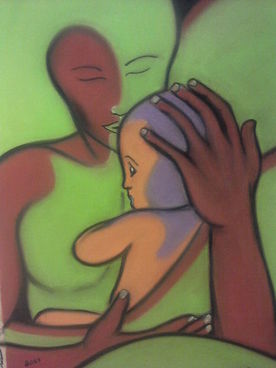 Papa et bebe by Bliu Pastels Papa et bebe by Bliu Pastels By Elia Rocha Most of the children who enroll in our Play House programs live with just one parent, and usually that parent is their mother. While fathers may be involved in their lives, more often than not that involvement is sporadic, unstable, and in many cases, marked by episodes of domestic violence. Certainly, the families we work with represent the extreme low end of economic, social, and household stability and are not necessarily representative of our larger society. They do, I think, however, show us where the major fault-lines lie which can so often threaten to split families apart. I won’t argue here that two-parent households are inherently better for children than one-parent households because so much depends on the capacity of mom or dad to provide a safe, nurturing, and consistent environment. Surely, a child is better off with one stable parent, than with two unstable parents. In these cases, one plus one definitely does not equal two. However, it is sometimes jarring to see the utter lack of any nurturing men involved in these children’s lives. Even within our own programs, having a male teacher is so rare as to seem an aberration. It is true that in the child development field, male caregivers are sadly few and far between. I think this has to do with an outdated but pervasive misconception that caring for young children is still woman’s work. Does this perception extend to father’s themselves? I hope not. I do think that whether or not we hold mothers more accountable for raising children than fathers, we are less surprised and more resigned when fathers are not around. That certainly does a disservice to all the fathers and other male caregivers who are providing for and nurturing children. I fear it also leaves many of the children we serve with the skewed sense that men - a whole segment of our population - are not there to care for them. Comments are closed.
|
AuthorVarious members of the Children Today staff contribute to these blog posts. Archives
July 2024
Categories |
